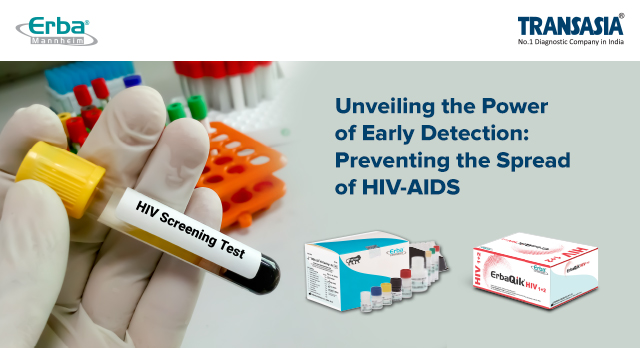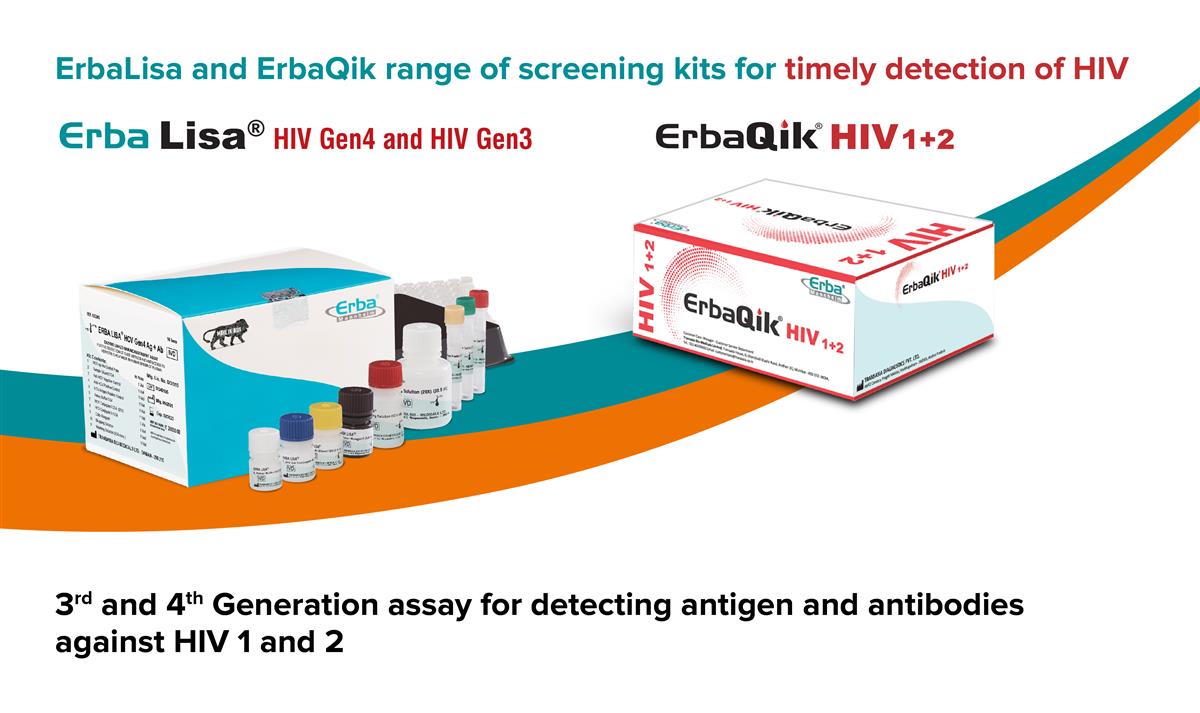Empowering through Early Detection: Safeguarding against the Transmission of HIV-AIDS

Human Immunodeficiency Virus (HIV) poses a significant global health challenge, affecting millions of lives. In India alone, 24 lakh people live with HIV, resulting in 40,000 deaths annually.1 The critical strategy to counter the severe health implications of HIV lies in early detection. Recognizing the significance of early diagnosis and adopting prevention measures empower individuals to manage their health effectively
The Cascade of HIV and its Serious Health Implications:
HIV is a virus that attacks the immune system, specifically CD4 cells (T cells), which play a crucial role in the body's defense against infections and diseases. HIV can lead to Acquired Immunodeficiency Syndrome (AIDS), a condition where the immune system is severely compromised, making individuals susceptible to opportunistic infections and cancers.
Early Detection - A Lifesaving Measure:
HIV is currently viewed as a chronic, manageable condition, with the majority of People Living with HIV (PLHIV) maintaining good health through timely and appropriate treatment. Late diagnosis is a critical factor linked to increased HIV-related health issues and mortality. Encouraging voluntary HIV testing with informed consent across diverse settings is imperative to identify cases early and facilitate timely intervention, contributing to improved health outcomes for individuals living with HIV.
Early detection of HIV is a game-changer in preventing the cascade of health issues associated with the virus. Modern testing methods, including rapid tests and nucleic acid tests, can detect HIV in its early stages, providing individuals with the opportunity to access life-saving treatments promptly.
Antiretroviral therapy (ART) is the cornerstone of HIV-AIDS management, effectively suppressing the virus and preserving immune function.
Preventing Opportunistic Infections:
One of the serious health consequences of untreated HIV is the increased risk of opportunistic infections. As the immune system weakens, the body becomes vulnerable to infections that would typically be easily controlled. The complications include Pneumocystis pneumonia, tuberculosis, various fungal infections, etc. Early detection can significantly reduce the risk of these infections.
Timely detection can also help in -
- Protecting neurological health - HIV can affect the central nervous system, leading to neurocognitive disorders (HAND), such as cognitive impairments, memory loss, and difficulties with concentration.3 Early detection can mitigate the impact on neurological health, preserving cognitive function and improving the overall quality of life for individuals living with HIV.
- Preventing cardiovascular complications: HIV has been linked to an increased risk of cardiovascular diseases, including heart attacks and strokes.4 Chronic inflammation and the effects of the virus on blood vessels contribute to this elevated risk. However, early detection and effective management through ART can reduce inflammation, improving cardiovascular health and lowering the risk of life-threatening events.
- Preserving Organ Function: Untreated HIV can lead to damage to vital organs such as the kidneys and liver. HIV-associated kidney disease and liver complications are serious health consequences that can be mitigated with early intervention.
Role of HIV screening kits in blood banking
HIV screening kits play a pivotal role in blood banking. Screening donated blood is crucial due to the heightened risk of HIV transmission through blood transfusions. Follow-up studies reveal that over 90% of recipients exposed to infected blood acquire HIV, underscoring the imperative to ensure thorough screening processes for donated blood.2
These testing kits, integral to blood banks, are specifically crafted to identify markers of Transfusion-Transmissible Infections (TTIs), including HIV, hepatitis B and C, and syphilis. The swift and precise results generated by these kits are instrumental in promptly identifying potentially contaminated blood, thereby safeguarding against the transmission of infectious diseases through blood transfusions.
The journey towards preventing the serious health consequences of HIV begins with early detection
Transasia Bio-Medicals Ltd. presents a complete range of diagnostic kits for diagnosis of HIV. Our offerings include the ErbaQik HIV 1+2 and ErbaLisa HIV Gen 3 and Gen 4 encompassing both rapid and ELISA screening kits. Notably, ErbaLisa HIV Gen 4 enables early diagnosis by simultaneously detecting p24 Antigen and Antibodies to HIV 1 and HIV 2. Additionally, our 'Point of Care Testing Solution' includes ErbaQik HIV 1 +2, a rapid test ideal for mass screening in high-risk populations during camps. All these screening kits offer unparalleled sensitivity and specificity, ensuring precise and timely HIV diagnosis.
 Accessible testing, coupled with education and awareness campaigns, empowers individuals to take control of their health. Timely medical intervention and effective HIV management become possible, not only improving the well-being of those living with HIV but also contributing to breaking the transmission chain. This collective effort creates healthier communities for generations to come. Early detection isn't just a medical milestone; it's a lifeline guiding us towards a brighter and healthier future.
Accessible testing, coupled with education and awareness campaigns, empowers individuals to take control of their health. Timely medical intervention and effective HIV management become possible, not only improving the well-being of those living with HIV but also contributing to breaking the transmission chain. This collective effort creates healthier communities for generations to come. Early detection isn't just a medical milestone; it's a lifeline guiding us towards a brighter and healthier future.
References:
- https://naco.gov.in/sites/default/files/India%20HIV%20Estimates%202021%20_Fact%20Sheets__Final_Shared_24_08_2022.pdf
- Sarah Robbins Scott, Zunyou Wu, Risks and challenges of HIV infection transmitted via blood transfusion, Biosafety and Health, Volume 1, Issue 3, 2019, Pages 124-128, ISSN 2590-0536.
- Saylor D, Dickens AM, Sacktor N, et al. HIV-associated neurocognitive disorder--pathogenesis and prospects for treatment [published correction appears in Nat Rev Neurol. 2016 May;12(5):309]. Nat Rev Neurol. 2016;12(4):234-248.
- Feinstein MJ. HIV and Cardiovascular Disease: From Insights to Interventions. Top Antivir Med. 2021;29(4):407-411.